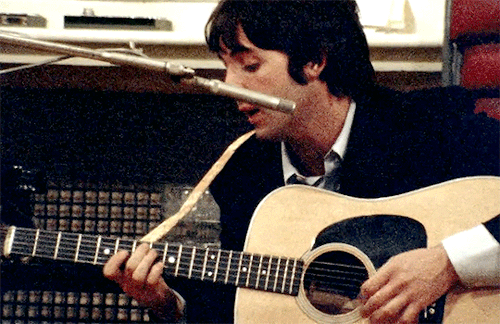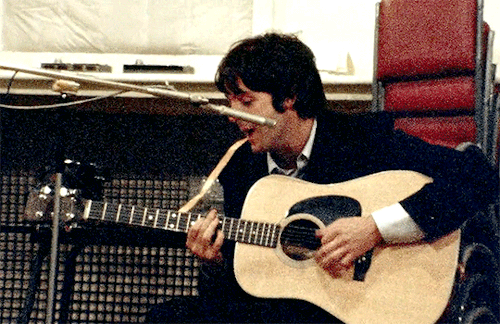2003: The Quarrymen Have Conflicting Hazy Memories On What Happened The Day John And Paul First Met.
2003: The Quarrymen have conflicting hazy memories on what happened the day John and Paul first met. (Note: In order of appearance: Rod Davis, Len Garry, Colin Hanton, Eric Griffiths. Ignore the erroneous lower third that pops up indicating Len Garry; it’s Eric Griffiths.)
More Posts from Chetthedog1904 and Others

Gorgeous


George and Paul / Hamburg. 1960
Mirabelle: George Harrison tells his own life story. (October, 1963)
Hi girls, George Harrison here, lead guitar.
I’m not taking any notice of course, but the other three are skipping around the room, saying, “Hi girls! George Harrison here, lead guitar.” Well, I’ve got to introduce myself some way, haven’t I?
One thing about us Beatles is that we’re just as nutty now as we ever were. Our chart success hasn’t changed us, thank goodness. I remember the first time I ever met Paul was on the bus home from school. He was sitting laughing to himself. I thought, “We’ve a right case here,” and then I realised he could see his own reflection in the window. Well, I thought, that explains it!
John, I recall, was eating fish and chips, but his hair being so long kept getting in the way! Ringo, who I met in a club, looked moody. Then when we started talking he explained he’d been talking hard and the effort was too much for him. He can’t help it, poor lad.
I was never officially introduced to myself. In accordance with the natural custom I was born, at the time being fairly small (about twenty inches long). My mother insists that I was brought into the world singing and playing a guitar, but I think she’s joking.
Keep reading
Get Back Narrative
I’ve received a couple of asks seeking clarification regarding my earlier post about how the Get Back documentary was redefining the Beatle narrative.
I’ll try to summarize.
1. Media articles like this, this and this regarding Ono’s presence. While it’s obvious that the band was heading toward dissolution with or without Ono’s presence, Ono’s continued presence in the studio, her unsolicited participation in band business (no, she didn’t just sit there and read, as some would claim), and her willingness to speak on John’s behalf is hardly exculpatory. Even Time magazine, which at least attempted a more considered analysis of the Beatle break-up era, claimed, after watching Get Back, that ‘Yoko’s presence was not a huge negative factor, and that none of the band members appear much bothered by her constant presence; they joke and talk with her comfortably”. This is a shocking claim, given that a) the documentary clearly depicts the deleterious effect of Yoko’s presence upon band members during the failed meeting at George’s house, and b) George, Paul, and Ringo have all gone on record regarding their discomfort in Ono’s presence and the disruptive nature of her involvement in band business.
(As an aside, I would also like to know in what workplace, no matter how creative or unorthodox, it would be acceptable to bring your lover or spouse to work everyday and insist that the presence of that person was absolutely benign.)
2. The exclusion of information which would provide context to behaviour, such as John and Yoko’s heroin addiction. “By the advent of the “Get Back” sessions, Ono openly joked about taking heroin being the couple’s form of exercise”). This was excluded in the Get Back documentary and, as a consequence, from mainstream media. Obviously the inclusion of this information would more accurately contexualize John’s behaviour in the band, including his insistence on Yoko’s presence.
Another compelling piece of information that was not included in the documentary was that Patti Harrison briefly left George around the time of George’s departure from the band. Since there was no mention of this event during filming, Peter Jackson decided not to share it, claiming he didn’t want to make any “moral judgements.” To whatever extent his brief estrangement from Patti affected George’s judgement we’ll never know (George didn’t even mention it in his diary of that day), but its exclusion in the documentary is regrettable.
3. Editorial Choices by the filmmaker. Peter Jackson has gone on record that he was not influenced by Ringo or Paul, and nor by Olivia or Yoko at any point in the making of the Get Back Documentary. And there’s no reason not to believe him. But: the Get Back documentary reflects his editorial choices–what he believed was important to leave in, and what he believed was acceptable to leave out. As Erin Torkelson Weber indicated in this earlier post, “the reality is that, without unrestricted access to the hundreds of hours of actual audio and visual tapes Hogg and Jackson used to make their films, fans are still being offered only someone else’s interpretation/vision/translation of the primary source material…so we have to rely on evidence that has already been framed and filtered.”
And that reality–that we are watching someone’s else’s version of the truth, has escaped mainstream media and a certain cohort of Beatle fans who either find the Get Back version of the Beatle break-up era more commensurate with their own beliefs, or simply don’t know any better.
I never realized John joined Paul on the stairs. I thought John had left by then. Good show of support.

John Lennon & Paul McCartney at the British Embassy after their concert in Washington, DC | 11 February 1964 © Fred Ward
-
 cocaineskinny909 reblogged this · 7 months ago
cocaineskinny909 reblogged this · 7 months ago -
 cocaineskinny909 liked this · 7 months ago
cocaineskinny909 liked this · 7 months ago -
 ideaspossessthemind liked this · 11 months ago
ideaspossessthemind liked this · 11 months ago -
 pjiminly liked this · 11 months ago
pjiminly liked this · 11 months ago -
 farkyeahmylife liked this · 1 year ago
farkyeahmylife liked this · 1 year ago -
 tavolgisvist liked this · 1 year ago
tavolgisvist liked this · 1 year ago -
 yulia-k-blog liked this · 1 year ago
yulia-k-blog liked this · 1 year ago -
 kinsfaun liked this · 1 year ago
kinsfaun liked this · 1 year ago -
 itsonlymeiloveyou reblogged this · 1 year ago
itsonlymeiloveyou reblogged this · 1 year ago -
 itsonlymeiloveyou liked this · 1 year ago
itsonlymeiloveyou liked this · 1 year ago -
 the-60s reblogged this · 2 years ago
the-60s reblogged this · 2 years ago -
 inmylifebeatlebug liked this · 2 years ago
inmylifebeatlebug liked this · 2 years ago -
 cosmic-relaxation liked this · 2 years ago
cosmic-relaxation liked this · 2 years ago -
 majinmelmo reblogged this · 2 years ago
majinmelmo reblogged this · 2 years ago -
 psy-kylo-gy liked this · 2 years ago
psy-kylo-gy liked this · 2 years ago -
 thestarsarecool reblogged this · 2 years ago
thestarsarecool reblogged this · 2 years ago -
 thestarsarecool reblogged this · 2 years ago
thestarsarecool reblogged this · 2 years ago -
 thestarsarecool liked this · 2 years ago
thestarsarecool liked this · 2 years ago -
 boredcatlady0 liked this · 2 years ago
boredcatlady0 liked this · 2 years ago -
 chetthedog1904 reblogged this · 2 years ago
chetthedog1904 reblogged this · 2 years ago -
 chetthedog1904 liked this · 2 years ago
chetthedog1904 liked this · 2 years ago -
 underthecitysky reblogged this · 2 years ago
underthecitysky reblogged this · 2 years ago -
 durinsmane liked this · 2 years ago
durinsmane liked this · 2 years ago -
 beatlepaul4ever liked this · 2 years ago
beatlepaul4ever liked this · 2 years ago -
 beatlepaul4ever reblogged this · 2 years ago
beatlepaul4ever reblogged this · 2 years ago -
 redlegotwobyfour liked this · 2 years ago
redlegotwobyfour liked this · 2 years ago -
 perfect-trash-king liked this · 2 years ago
perfect-trash-king liked this · 2 years ago -
 thefortunateisle liked this · 2 years ago
thefortunateisle liked this · 2 years ago -
 bambi-kinos reblogged this · 2 years ago
bambi-kinos reblogged this · 2 years ago -
 banjoandthepork liked this · 3 years ago
banjoandthepork liked this · 3 years ago -
 stephantom liked this · 3 years ago
stephantom liked this · 3 years ago -
 angelwitchz liked this · 3 years ago
angelwitchz liked this · 3 years ago -
 virginwalk liked this · 3 years ago
virginwalk liked this · 3 years ago -
 aint-that-kind-of-blog-bruv liked this · 4 years ago
aint-that-kind-of-blog-bruv liked this · 4 years ago -
 mollyboughtthering liked this · 4 years ago
mollyboughtthering liked this · 4 years ago -
 concreteflavoured liked this · 4 years ago
concreteflavoured liked this · 4 years ago -
 noix2020 reblogged this · 5 years ago
noix2020 reblogged this · 5 years ago -
 friendodorothys liked this · 5 years ago
friendodorothys liked this · 5 years ago -
 charliethealpaccaso liked this · 5 years ago
charliethealpaccaso liked this · 5 years ago -
 clownedcrown liked this · 5 years ago
clownedcrown liked this · 5 years ago -
 harrisonmccartney reblogged this · 5 years ago
harrisonmccartney reblogged this · 5 years ago -
 anais-pier liked this · 5 years ago
anais-pier liked this · 5 years ago -
 findsilver reblogged this · 5 years ago
findsilver reblogged this · 5 years ago -
 ametsbentim liked this · 5 years ago
ametsbentim liked this · 5 years ago -
 terrcherr liked this · 5 years ago
terrcherr liked this · 5 years ago -
 matchdroid liked this · 5 years ago
matchdroid liked this · 5 years ago -
 nos-ok liked this · 5 years ago
nos-ok liked this · 5 years ago











